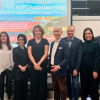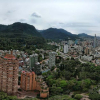Translated by Andrés Martínez
This week, medical students, researchers, professionals, and officials from Maputo, the capital of Mozambique, along with members of the ‘De Camino al Colegio’ (On the Way to School) project, are visiting Bogotá. This team is conducting a global research aimed at understanding the acceptability, impact, feasibility, and adaptability of active mobility programs to and from schools, in order to promote healthy lifestyles and mental well-being among school-aged adolescents, 8 to 16 years old.
This three-year study focuses primarily on reducing the risks of non-communicable chronic diseases by evaluating two significant school projects in Bogotá: 'Ciempiés Caminos Seguros' (Safe Paths Centipede) and 'Al Colegio en Bici' (Biking to School).
Contenidos relacionados
To conduct the evaluation, the project employs mixed methods, including semi-structured interviews with key stakeholders involved in the creation, development, and evolution of the programs. Additionally, in schools, initial measurements of social determinants of health indicators will be taken among program beneficiaries and non-beneficiaries to understand the potential positive impacts generated by these projects in Bogotá.
In this post on the social network X, by the Bogotá Mobility Secretariat, experiences shared with experts and researchers from London and Maputo who seek to replicate Bogotá's school mobility practices from the 'Safe Paths Centipede' and 'Biking to School' programs are highlighted:
¡Somos ejemplo mundial en movilidad escolar activa! 🤓
— Movilidad Bogotá (@SectorMovilidad) May 4, 2024
Nuestras niñas y niños 🧒🏻 👧🏽 de @alcolegioenbici y @CiempiesNP fueron los protagonistas de esta semana durante la visita del proyecto internacional @ontheway_school.
▶️Así acogimos a expertos e investigadores de Londres y… pic.twitter.com/19UrB02wpY
Citizen science methods will be used in these educational institutions to identify barriers and facilitators of the built environment towards the adoption of active transportation modes to and from school.
Bogotá, a global example in school mobility
Once again, these Bogotá initiatives are the focus of study and an example for the world, as similar pilot plans for school mobility are expected to be implemented in Maputo, Mozambique, based on the results.
"Balancing health and mobility issues is very important for the well-being of children. We believe and feel that this experience we are having today in Bogotá can be implemented in Maputo. There will be many challenges because there we are accustomed to being very independent, but such projects are necessary to ensure their safety on the roads," explained Alice Magia de Abreu, Secretary of Health and Quality of Life of the Maputo Council.
During these days, the Bogotá Mobility and Education Secretariats are participating in various events and tours to share and showcase the implementation of these projects. Likewise, training sessions on the tools and instruments to be used in the research and discussion spaces among participants, experts, and decision-makers will be held.
"We feel very honored to be part of this project that places us as a global reference in terms of active mobility and care to and from school. For us, it is very important to share our experience with the intention that it be replicated in other cities. Also, it is very valuable for Bogotá to receive the results of the impact that programs like 'Children First' provide to its beneficiaries in terms of physical health and, above all, in their mental and social development," said Jhon González, Deputy Secretary of Mobility Management.
This research will bring multiple benefits to Bogotá. Among them, it will provide evidence-based arguments on how active mobility projects to school such as
'Ciempiés' (Centipede), 'Al Colegio en Bici' (Biking to School), and 'Bicipareceros' (BikeBuddies) influence the physical and mental health of students, strengthening the need to maintain and expand them.
‘De Camino al Colegio’ (On the Way to School) is a project funded by the Global Alliance against Chronic Diseases and led by University College London in the United Kingdom, which involves an interdisciplinary team of researchers from universities such as Los Andes, Newcastle University, Tufts University, Stanford, Eduardo Mondlane University, as well as organizations like Architects without Borders and the Anna Freud National Centre for Children and Families.




